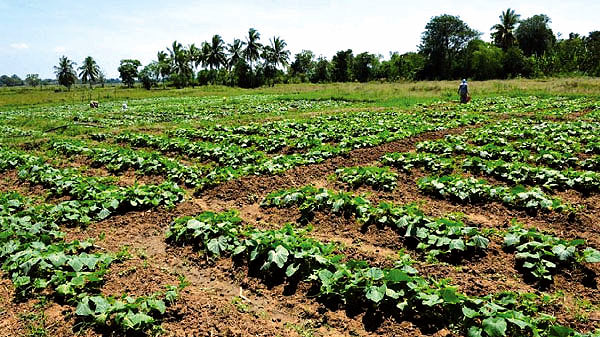Veggie prices bounce to new highs on lack of fertiliser

Fertiliser shortages and extreme weather have once again triggered a sharp rise in vegetable prices at a time the government is aiming for a ‘waga sangramaya’, or a cultivation revolution.
The prices of nearly every vegetable, including carrots, beans, pumpkin, bitter gourd, snake gourd, cabbage, drumsticks, ridged gourd, (wetakolu), ash plantain, leeks, knol khol, and radish have increased from a few weeks ago and are much higher compared with last year.
Cabbage is sold at Rs 217 per kilo, while it was only Rs 187 a few weeks ago. Cabbage was selling for Rs 118 per kilo last year.
A kilo of carrots is sold at Rs 190 on average, compared with Rs 170 a few weeks ago and Rs 150 last year, the Census and Statistics Department’s price analysis report said.
Bitter gourd that was Rs 192 per kilo has increased to between Rs 260 and Rs 300. Pumpkin per kilo now varies from Rs. 120 to Rs 200 with the average retail price of Rs.170.
Snake gourd sells for between Rs 180 and Rs 240 per kilo. Ridged gourd is Rs 195 per kilo compared with last year’s Rs 168.
According to the Hector Kobbekaduwa Agrarian Research Institute, beans per kilo in the wholesale market is sold between Rs 220 and Rs 240. In the retail market it sells for up to Rs 320 per kilo. Low supply from Nuwara Eliya areas is cited as the reason for price increase.
Drumstick sells for between Rs. 220 and Rs 240 per kilo, wholesale, when it was Rs 153 last year.
“The shortage of fertiliser really hit us. Some have completely stopped cultivation. During the coronavirus lockdown, farmers were not guided by agriculture officers, added to that was the hot and dry weather that affected vegetable crops. These were the reasons for the low supply,” said T.B. Sarath of the All Island Farmers Association.
He said disaster plans are necessary, from promoting green house facilities to farmers in the central hills, to flood control measures to low country farmers and cold storage facilities at economic centres.
Vegetable grower also face infestations of pests and most farmers need to be introduced to modern pest management by promoting predatory insects that feed on snails, slugs, worms, caterpillars and other insects that feed on vegetables. Otherwise, the government’s attempt to promote organised fertiliser use will not be successful. Most farmers complain that the fertilisers they get are of poor quality,” he said.
According to him, the country’s annual vegetable demand needs to be assessed and seasonal vegetable cultivation should be guided, while having more vegetable storages at economic centres to prevent waste.
Senior agriculture economist and director of Agriculture Department’s Social Economic and Planning Centre, Peradeniya, Dr. R.M. Herath said the fertiliser shortage resulted in many people resorting to home gardening and vegetable cultivation during the coronavirus lockdown.
“Vegetable cultivation is sensitive to weather changes varying from hot weather to floods. There is a need to make more investments. Cold storages are a must and promotion of early warning to farmers about the weather and seasonal vegetables that will bring them more benefit.’’
He said a crop forecasting system has been introduced. Farmers and agriculture officers with technology available have been requested to log on to croplook.net and for others to receive information on their phones.
“Early warning messages for vegetable farmers that includes price prediction and crop selection is available. Field officers are instructed to warn farmers if the farmers are adamant on growing a vegetable that may bring losses from weather or over production.”
Dr. Herath said there is a need for investment in cold storages at economic centres were wastage occurs.
Addressing this week’s meeting to discuss activities of the State Ministry of Regulation of Fertiliser Production and Supply, use of Chemical Fertilisers and Pesticides, President Gotabaya Rajapaksa said payments have been made for this year’s imports of fertiliser and stressed that imports are being made to ensure fertiliser requirements of estates and farmers are met.
He also instructed officials to start production of fertiliser immediately, while investments will be made by the Ministry of Agriculture.
Minister of Agriculture, Mahindananda Aluthgamage said there are plans to purchase vegetables directly from farmers. As a pilot, vegetables are bought directly from farmers and a bag containing six vegetable costing about Rs. 750, is sold for Rs 350, in 10 locations within Colombo city limits such as the Fort and Maradana railway stations, Nugegoda area, Sethsiripaya, Isurupaya, Suhurupaya as well as in the Kandy city limits.
Co-Cabinet spokesman, Ramesh Pathirana, this week said the Cabinet has approved imports of an additional 300,000 metric tons of fertiliser.
(Source: The Sunday Times – By Nadia Fazlulhaq)

Latest Headlines in Sri Lanka
- Court of Appeal to rule on IGP Tennakoon’s arrest warrant on March 17, 2025 March 12, 2025
- Military deserter arrested for sexually assaulting doctor at Anuradhapura Hospital March 12, 2025
- Tuition teacher under investigation for student assault ignores NCPA summons March 12, 2025
- Sri Lanka maintains stance on Adani, open to investment March 12, 2025
- Doctors strike over delay in arrest of sexual assault suspect March 12, 2025


